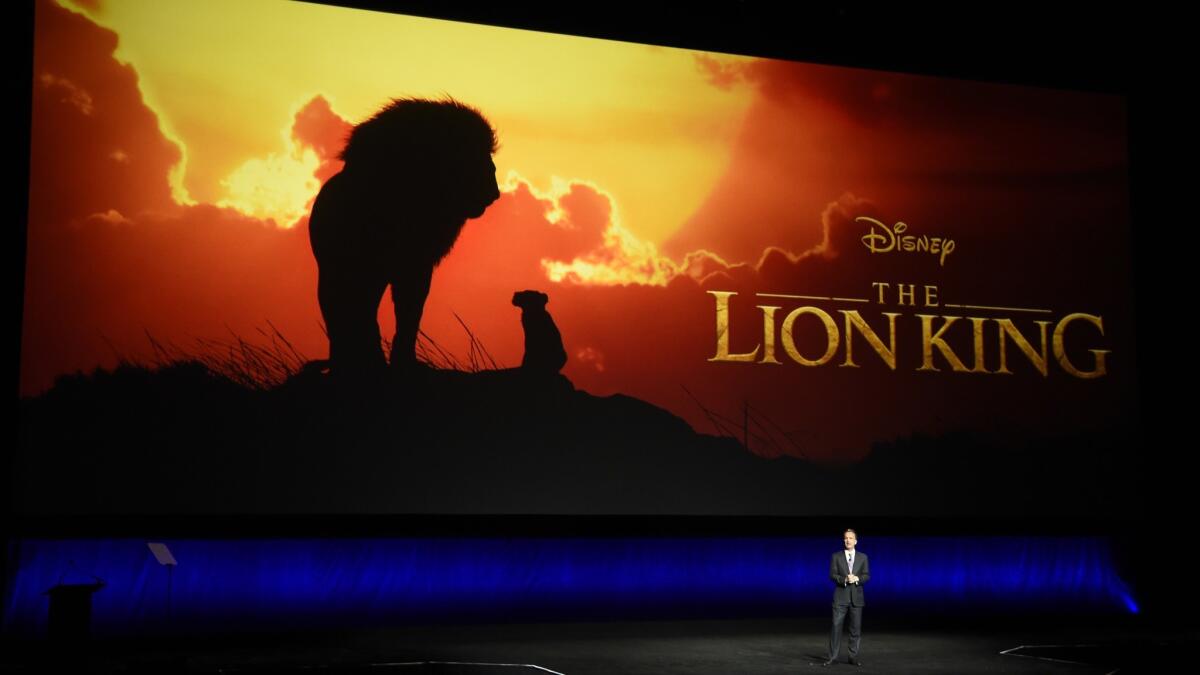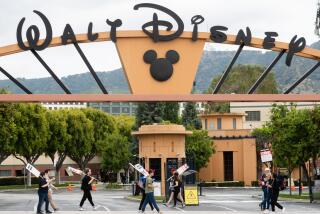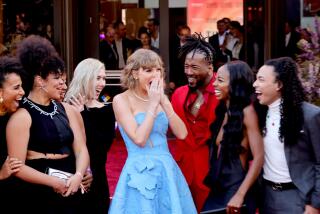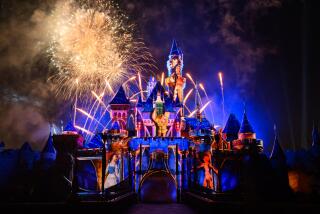With new versions of ‘Aladdin’ and ‘The Lion King,’ Disney straddles nostalgia and novelty
It’s Hollywood’s version of the circle of life: Take an old movie that’s hardwired into one generation’s childhood memory banks, give it a fresh coat of cinematic paint and send a new iteration into theaters for the next generation to hopefully fall in love with just as their parents did. And no studio plays this particular circle game better than the Walt Disney Co.
This summer, Disney will offer up not one but two remakes of classic animated films from its back catalog — each gussied up with new stars, new songs and the latest filmmaking technology.
A live-action version of 1992’s “Aladdin” hits theaters May 24, with Will Smith stepping into the role of the mischievous, shape-shifting Genie voiced in the original film by Robin Williams. And a new take on 1994’s smash “The Lion King” from director Jon Favreau arrives July 19, employing the same photorealistic CGI that Favreau showcased in 2016’s “The Jungle Book.”
In serving up these new spins on much-loved films, the studio is trying to strike a delicate balance, delivering a warm and fuzzy nostalgia fix — amplified by familiar songs like “A Whole New World” and “Friend Like Me” from “Aladdin” and “The Circle of Life” and “Hakuna Matata” from “The Lion King” — while also offering audiences something unexpected.
“We really try to weigh, what is in the contract with the audience? What do they want to feel? What are specific moments that, if you are going to change or lose them, you do so at your own peril?” said Sean Bailey, Disney’s president of production. “Then you combine that with what gets us really creatively excited. When you can find those two things in concert, that’s wonderful.”
For Disney, this strategy of revisiting and retrofitting titles from its vaunted library dates back to Tim Burton’s 2010 live-action reimagining of “Alice in Wonderland,” which grossed more than $1 billion worldwide. In the years since, the studio has found success with new versions of “Cinderella,” “The Jungle Book” and “Beauty and the Beast” as well as the “Sleeping Beauty” spinoff “Maleficent.”
Though Disney’s most recent reimagining, Burton’s “Dumbo,” was deemed a box office disappointment when it hit theaters last month, the studio is moving full steam ahead with other remakes. Live-action versions of “The Little Mermaid” and “Mulan” are in the works, a “Maleficent” sequel is set to open in October, “Lady and the Tramp” will debut with the launch of the Disney+ streaming service in November, and a potential origin story featuring Cruella de Vil, the villainess of “One Hundred and One Dalmatians,” is in development.
As the studio has discovered, however, even with the most seemingly timeless films, certain elements may not have aged so well in the intervening years. With attitudes shifting over time, depictions of gender roles and other cultures that were acceptable in decades past may now induce cringes or eye rolls. In the case of “Aladdin,” director Guy Ritchie’s new version tweaks the original film’s love story between Princess Jasmine (now played by Naomi Scott) and the street hustler Aladdin (Mena Massoud) to give it a female-empowerment spin fit for today’s era.
SUMMER SNEAKS: Everything you need to know about 2019’s summer movies »

“Jasmine’s main goal in the original movie is really to find a spouse, and in this movie there’s much more than that,” said “Aladdin” producer Dan Lin. “She really wants to help to rule Agrabah and take a much bigger leadership position.”
The filmmakers took similar care to update aspects of the depiction of Middle Eastern culture that stirred controversy in the animated version. (After complaints by the American-Arab Anti-Discrimination Committee, a line in the original film’s opening song “Arabian Nights” was changed for the home-video release from “where they cut off your ear if they don’t like your face” to “where it’s flat and immense and the heat is intense.”)
“We work hard to educate ourselves as much as we can with really smart people on all of the titles, individually and collectively,” said Bailey. “As far as movies that may deal with cultural sensitivity, like ‘Aladdin’ or our upcoming ‘Mulan,’ we will bring in a number of scholars, professors and experts and we talk to them throughout the process. We’re really trying to both honor what has made the story timeless but also make sure we’re being cognizant and intelligent about the times we find ourselves in.”
With Smith’s turn as the Genie, the new “Aladdin” aims to offer something different and more in tune with today’s pop culture than Williams’ memorably manic performance.
“Robin Williams’ character was so iconic in the way the played it, and we thought, Is there a way to go that both honors what he did and makes it feel fresh and new?” said Lin. “Will had a very specific point of view of how he wanted to play this genie. There are parts of it that are very personal to him and personal to his style. We call it kind of the hip-hop genie.”
Highlighting the dangers of mucking around with a cherished property, however, early glimpses of Smith’s Genie were greeted by fans on social media with skepticism, if not derision.
“There’s been a lot of controversy over the Genie: Is he too blue? Is he not blue enough? What shape does he take?” Lin said. “You’ll see in our movie the Genie takes lots of different forms. Sometimes he’s many feet tall, sometimes he’s brown, sometimes he’s blue — he’s got multiple versions of himself.”

The new version of “The Lion King” — boasting an all-star vocal cast including Donald Glover as the young lion Simba alongside Seth Rogen, Beyoncé, Alfre Woodard and, returning to provide the voice of elder lion Mufasa, James Earl Jones — has faced even greater scrutiny. Poring over the film’s recently released trailer, some fans criticized the look and sound of the film’s villain, Simba’s uncle Scar, voiced in the original movie by Jeremy Irons and in the new version by Chiwetel Ejiofor.
While he didn’t personally grow up with the original “Lion King,” Favreau said he fully understands the reverence for the film, which, like “Aladdin,” has spawned direct-to-video sequels and a Broadway musical. Indeed, with “The Lion King” still reigning as the highest-grossing traditionally animated film of all time, the intensity of interest comes as no surprise.
“I pay attention [to the fans] because it’s their movie too,” Favreau said. “They grew up with this thing, and there’s some sort of collective understanding between the filmmaker and the audience around the world of what the essence and spirit of ‘The Lion King’ is. You can’t react and overcorrect to each comment because there’s such an array of different specific opinions. But you can get a sense as you listen to the zeitgeist reverberating that people seem to be connecting with it.”
While the new “Lion King” has been widely referred to as a live-action version, in reality it’s a different kind of animal, taking the immersive computer-generated animation of “The Jungle Book” and pushing the technology even further.
“The environments are all digital and the animals are all digital,” said Favreau. “Everything is generated by a computer — except for one shot. There’s one shot in the movie that’s a real shot of a real environment that I put in just to see if anybody would be able to pick it out.” (Asked for a hint of what that shot might be, Favreau demurred: “Let’s wait. That’ll be a trivia question.”)
Having now worked on two remakes of beloved Disney films, Favreau is perhaps more aware than anyone of the particular challenges involved. When his “Lion King” opens, he just hopes fans of the original film will walk into the theater with an open mind.
“You have to enter the process with a humility and make a case for not just watching the original,” Favreau said. “You have to be additive to the experience and dimensionalize it. You have to surprise people but also deliver on their expectations. And that’s the game.”

Twitter: @joshrottenberg
More to Read
Only good movies
Get the Indie Focus newsletter, Mark Olsen's weekly guide to the world of cinema.
You may occasionally receive promotional content from the Los Angeles Times.







